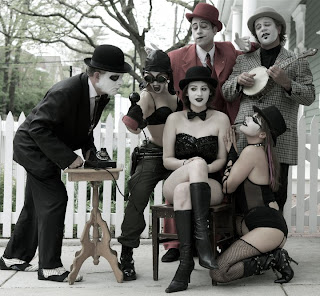After sitting down to an interview with Sean Guinan, front man of Candy Town, I attempted to explore the mastermind behind the group and see what makes it tick. The interview was deep, meandering, and incredibly all-comprehensive, so for purposes of not flooding the entire page, I’m going to paraphrase and condense this information.
First, some history: Candy Town began not so much as a musical project, but as an aesthetic in Guinan’s films. The central matter in them is the dichotomy between fantasy and reality. Guinan represented elements of his inner-person and imagination as clown figures. By whitening their faces, clowns remove specific details that make them an individual, and thus, make themselves a representation of some sort of aspect of the human condition and everything they do, a metaphor. They are humans abstracted and placed into a heightened reality where things can become incredibly unpredictable and exciting.
Guinan always wanted to create a band called Candy Town and in fact, began a TV series with the same name. This show played upon the idea of a place called Candy Town, where we all grew up with characters from fairy tales and elements of fantasy, but it is also a place left behind by adults who have moved on past such things. It is a place where we’d like to indulge in, yet are constantly pulled back by the forces of adulthood.
As time went on, prospects of starting such a band with this theme became more and more realized. Musically, Guinan was raised on a somewhat less than typical musical background. He grew up listening to 20’s and 30’s Jazz. At the time, Guinan wasn’t really conscious of rock and roll and what was popular on the radio. As time went on, he did become more familiar with and enjoyed rock groups such as the Rolling Stones and The Velvet Underground, yet his pop culture continued to revolve around figures such as Louie Armstrong and Charlie Chaplin. Ultimately, Guinan wasn’t interested in mimicking music from this period, as much as he was interested in borrowing elements and aesthetics.
What really influenced Guinan the most was a group he simply ran into one day at a festival called Maestro Subgum & The Whole. He was just in high school at the time and never saw the likes of them before. The band was dressed very eclectically, with a raspy front man and operatic female backup singers. There were no guitars, just an electric bass, keyboard, and horn section. They seemed to have this infectious air of intrigue about them. It was as if they were a traveling band of Gypsies and Guinan, dazed by a romantic sense of escapism, wanted to travel away with them. This is what he wanted to capture, that enticing feeling of leaving everything behind to follow a circus that has offered a passage into a world once inhabited only by your juvenile mind.
And so, Guinan took the bull by the horns and with a strong will, made Candy Town his project. He long admired the brilliant works of artists such as Orson Welles, Woody Allen, Charlie Chaplin, and David Lynch, who completely controlled their projects, no matter how many were involved, in order to ensure that their vision was realized. Powerful works of art never came from committees, but of the solitary artist, like a philosopher, who delves deep into the self, trying to understand what makes them tick. Made up entirely of complete strangers on a new page without previous baggage, Guinan made sure everyone knew he would be directing Candy Town.
While not a band mimicking music from the 20’s and 30’s, Guinan wanted to utilize the iconography from this era. While first impressions may give way to this era being sweet and nostalgic, the truth was it was downright bold, sexy, and musically, very daring and edgy. This was not some dreamy marking strategy, as much as a spirited platform for what would become in itself, a bold musical project.
And so, the band dons vintage-style clothing from this era, yet wears face paint like mimes. Two female backup singers are scantily clad and the band as a whole use elements to further suggest something more motley, much like their music, borrowing from many directions, from rock to ragtime. Guinan’s aim was to wed the visuals with the sound into something more daring; learning from his disappointment from groups like Marilyn Manson, Kiss, and The Dresden Dolls, who all struck up something new and exciting with their imagery, but failed to deliver the same through their music.
The band tosses away common preconceptions of reality and norms, delving into the surreal through their performance; they truly take the audience for a ride. Rather than spare the lines that divide childish from mature, Candy Town pulls your wits from the stasis of a comfortable routine life into a challenge to live a life of an unknown tomorrow. To manifest your childhood’s greatest expectations of your own self, making a bold effort to become the person you thought you would. It’s the exciting prospect that anything really is possible, so long as you’re not afraid.
In the end, what is reality? What makes the surreal anything unreal? We’re all just dreams and vapor. Humanity often feels the test of truth is time, but time doesn’t bear anything when reality is really our conception. As Orson Welles said in F Is For Fake, “Our songs will all be silenced, but what of it? Go on singing.” No matter how we reconcile our outer-lives with our inner-lives, Candy Town wants to take you to a place you probably haven’t been to in a long time. You can’t run away with them, but you can always run away with your own wildest dreams.




